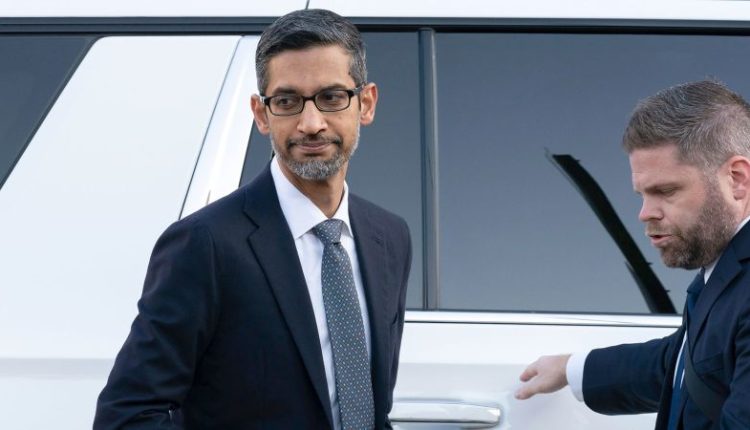Google CEO Sundar Pichai took the stand Monday at the US District Court for the District of Columbia to defend the search giant in the largest tech antitrust trial since the Microsoft case of the 1990s, marking a climactic moment in the US government’s weeks-long effort to prove that Google has illegally monopolized the online search market.
Pichai, whom Google called as a star witness, opened his testimony by recounting his journey from Chennai, India to Google and his path to becoming the tech company’s CEO in 2015.
Standing at a podium in a dark suit, crisp white shirt and gray tie, Pichai described how Google’s investments in Chrome, its proprietary web browser, accelerated users’ experiences with popular websites and led them to conduct more Google searches.
The history lesson is central to Google’s defense that the company’s search dominance owes to people preferring Google because it is the best, not because it behaved illegally to gain and preserve a monopoly.
By making Google’s search engine a seamless part of the Chrome browser, and by offering users a minimalist design that created more room for search results and web content within a browser window, Google believed it would drive more search usage, Pichai testified.
“The correlation was pretty clear to see,” Pichai said, before Google attorney John Schmidtlein presented an internal email from 2010 showing research that users who switched from Microsoft’s Internet Explorer performed 48% more Google searches. Users of Mozilla’s Firefox browser that switched to Chrome performed 27% more searches on Google, the email said.
Pichai’s testimony represents Google’s attempt to rebut claims by rivals including Microsoft CEO Satya Nadella, who testified last month that Google has thwarted competition in search and risks dominating the artificial intelligence sector by training its large language models on search query data that it controls.
The US government case against Google focuses on the company’s web of contracts that make its search engine the default on millions of devices and browsers around the globe. Google has paid Apple more than an estimated $10 billion a year to be the default on Apple devices and software. In 2021, Google paid $26.3 billion to secure default agreements with its partners worldwide, according to a slide introduced in the trial last week.
As Google has renegotiated its lucrative and notoriously opaque contract with Apple over the years — in 2016 and again in 2021 — Google moved to limit how Apple could treat search queries its users entered into its products, Pichai testified. Because Apple chooses which queries to refer to Google, and which it seeks to answer through Apple’s own search technology, Google feared that Apple might, for example, decide to send some search queries to Amazon.
“We wanted to make sure that as we contemplate a longer-term deal that the notion of default is implemented in a similar way” going forward, Pichai said, reflecting on his negotiations with Apple services chief Eddy Cue in 2016.
Later in Pichai’s testimony, the Justice Department tried to draw contrasts between Google’s strong desire to be the default search engine for millions of internet users on the one hand and its vocal objections to Microsoft appearing to make Bing the effective default search engine in Internet Explorer.
That year, Google sent Microsoft a lengthy letter outlining concerns about possible competition issues raised by Microsoft’s practice, according to an exhibit introduced in court.
“We are deeply concerned about the potential of harm to the competitive process from Microsoft’s actions,” Google wrote at the time, reminding Microsoft of its own past run-ins with antitrust regulators.
On Monday, a US government attorney pressed Pichai to acknowledge how the letter and other examples proved that Google considers search defaults to be extremely valuable — both financially and in terms of driving user search behavior generally.
But Pichai disputed any potential parallels between the two situations, describing Google’s deals as standard promotional agreements. Microsoft’s practice, he suggested, raised concerns because it did not adequately inform users of their opportunity to select a different search provider; instead, he said, Internet Explorer simply imported a user’s prior preference, and if the user had not made a selection, it would default to Bing.
This is a developing story. It will be updated.
Read the full article here

